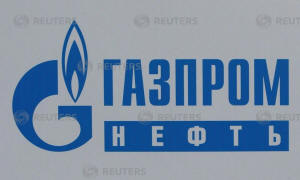|
Exclusive: Russia clashes with Western
oil buyers over new deals as sanctions loom
 Send a link to a friend
Send a link to a friend
 [November 09, 2018]
By Olga Yagova and Dmitry Zhdannikov [November 09, 2018]
By Olga Yagova and Dmitry Zhdannikov
MOSCOW (Reuters) - Russian energy majors
are putting pressure on Western oil buyers to use euros instead of
dollars for payments and introducing penalty clauses in contracts as
Moscow seeks protection against possible new U.S. sanctions.
Seven industry sources told Reuters that Western oil majors and trading
houses have clashed with Russia's third and fourth biggest producers,
Gazprom Neft and Surgutneftegaz, over 2019 oil sales contract terms
during unusually tough annual renegotiation in recent weeks.
The development mirrors a similar stand-off between Western buyers and
Russia's top oil producer, Rosneft <ROSN.MM>.
Earlier this week, trading sources told Reuters that Rosneft wants
Western oil buyers to pay penalties from 2019 if they fail to pay for
supplies in the event that new U.S. sanctions disrupt sales.
Now sources have told Reuters that Surgutneftegaz and Gazprom Neft have
also clashed with their buyers over penalties and the use of euros and
other currencies to replace the dollar in contracts.

"It is part of the same trend - the Russian oil industry is working on
mitigating new sanctions risks. The buyers in turn argue they cannot
carry those risks so we are trying to find compromises," said one source
with a Western buyer involved in negotiations, asking not to be named as
the talks are confidential.
Russia has been under U.S. and EU sanctions since 2014 when it invaded
Ukraine's Crimean peninsula. The sanctions have been repeatedly widened
to include new companies and sectors, making it tough for Russian oil
firms to borrow money abroad, raise new capital or develop Arctic and
unconventional deposits.
President Vladimir Putin's administration has been hoping for a thaw in
relations with the United States since President Donald Trump came to
power but Washington has imposed new sanctions instead, including on
some of Russia's richest people.
Russian businesses are preparing for a new wave of sanctions expected in
the coming weeks. The firms are trying to diversify away from dollar
payments and tapping Asia for more of their financing and technology
needs.
According to four industry sources, Surgutneftegaz asked buyers to be
prepared to switch from dollar to euro payments in contracts, and
insisted on buyers being effectively responsible for any losses arising
from sanctions.
"They basically said - sanctions don't matter. Buyers have to find a way
to pay, or to return purchased goods, or pay penalties," a source with a
big trading house said.
[to top of second column]
|

The logo of Russia's oil producer Gazprom Neft is seen on a board at
the St. Petersburg International Economic Forum 2017 in St.
Petersburg, Russia, June 1, 2017. REUTERS/Sergei Karpukhin/File
Photo

Gazprom Neft has also asked buyers to use euros in payments and bear
financial responsibility for contract breaches in the case of new
sanctions, according to three sources.
Gazprom Neft refused to comment. Surgutneftegaz did not immediately
respond to a Reuters request for comment.
"JUST LIKE IRAN"
Russia supplies over 10 percent of global oil, so drastic sanctions
against it could lead to a steep spike in oil prices.
All global oil majors rely on Russia to feed their refineries,
especially in Europe and Asia, and hence they cannot just walk away
from annual contract negotiations if they are unhappy with terms.
Talks with both Gazprom Neft and Surgutneftegaz have been
progressing slowly and painfully, according to trading sources.
Several Western buyers have managed to agreed compromises with
Surgutneftegaz and Gazprom Neft, but others are still in tough talks
with the producers, the sources said.
All Surgutneftegaz's contracts are bespoke and are negotiated
individually in the Siberian town of Surgut by the firm's management
and visiting Western trading bosses.
The sources declined to name companies that have already reached
compromise deals.
In one such compromise, a large European buyer agreed to the use of
euros in payments in exchange for Surgutneftegaz dropping its demand
for penalties from buyers who fail to pay for cargoes.
"We have been arguing that if sanctions make it impossible to pay
for an oil cargo, how on earth are we supposed to pay penalties,"
one trading source said.

"So we have agreed that the payment remains suspended for the entire
duration of sanctions - just like it works with Iran," he added.
(Reporting by Olga Yagova and Dmitry Zhdannikov; Editing by Giles
Elgood)
[© 2018 Thomson Reuters. All rights
reserved.]
Copyright 2018 Reuters. All rights reserved. This material may not be published,
broadcast, rewritten or redistributed.
Thompson Reuters is solely responsible for this content. |